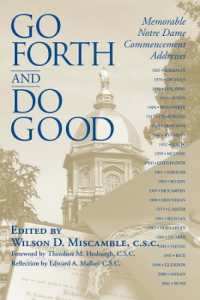- ホーム
- > 洋書
- > 英文書
- > Health / Fitness
Full Description
An eminent child psychiatrist provides an insider's, whistle-blowing perspective on the promotion of a diagnostic entity that does not exist.
Your Child Does Not Have Bipolar Disorder: How Bad Science and Good Public Relations Created the Diagnosis examines this diagnostic fad through a variety of lenses. Author Stuart L. Kaplan, MD, draws heavily on his forty years of experience as a clinician, researcher, and professor of child psychiatry to make the argument that bipolar disorder in children and adolescents is incorrectly diagnosed and incorrectly treated.
As Dr. Kaplan explains, the dramatic rise in this particular diagnosis is not based on scientific evidence, nor does it reflect any new discovery or insight about the etiology or treatment of the disorder. In fact, the opposite is the case: the scientific evidence against the existence of child bipolar disorder is so strong that it is difficult to imagine how it has gained the endorsement of anyone in the scientific community.
Your Child Does Not Have Bipolar Disorder: How Bad Science and Good Public Relations Created the Diagnosis explains to parents and professionals the faulty reasoning and bad science behind the misdiagnosis of childhood bipolar disorder. Dr. Kaplan critiques the National Institute of Mental Health, academic child psychiatry, the pharmaceutical industry, and the media for their respective roles in advocating this diagnosis. He describes very clearly what the children and adolescents actually do have, explains how it should be treated, and provides real-life clinical scenarios and approaches to treatment that work.
Contents
Acknowledgments
Introduction
PART I. CRITIQUE OF PEDIATRIC BIPOLAR DISORDER
1 Adult Bipolar Disorder and the DSM System
Adult Bipolar Disorder
The DSM System
2 Pediatric Bipolar Disorder
Pediatric Bipolar Disorder as ADHD and ODD
The Development of the Diagnosis of Pediatric Bipolar Disorder
Bipolar Disorder in the Very Young
One Authoritative View
3 Some Studies of the Scientific Basis of Pediatric Bipolar Disorder
Genetics
Age of Onset: Family Studies
Age of Onset: Self-Report
Epidemiology
Treatment or Prevention?
4 Cultural Influences in Pediatric Bipolar Disorder
How Culture Helps Shape Mental Illness
Pediatric Bipolar Disorder as a Media Event
Professional Support for the Diagnosis
Psychological Consequences of Misdiagnosis
Conclusion
5 Child and Adolescent Depression: A Brief Introduction
Diagnosing Depression in Children and Adolescents
The Diagnosis of Depression in Children and Adolescents and DSM-IV Criteria
Suicide
Depression and Bipolar Disorder
Conclusion
6 Did Romeo and Juliet Have Bipolar II Disorder? Bipolar Disorder in Adolescence
Romeo and Juliet
Aggression and the Misdiagnosis of Bipolar Disorder in an Adolescent
Bipolar Disorder in an Adolescent
Conclusion
PART II. MEDICATIONS AND PEDIATRIC BIPOLAR DISORDER
7 Three Medications for Pediatric Bipolar Disorder
Lithium
Valproate
Risperidone
Conclusion
8 Clinical Trials
A Change in Clinical Child Psychiatry
Introduction to Clinical Trials
Multisite Clinical Trials
Example of a Clinical Trial
Conclusion
9 Bad Science
The Importance of Falsification
Diagnostic Errors
Mixing Apples and Oranges
Chicken or Egg?
Conclusion
10 Stimulant Medications
Ethical Considerations
Increase of Use in Stimulant Medication
The MTA Study
Stimulant Risks
Conclusion
PART III. ADVICE FOR PARENTS
11 Medication Advice for Parents
Stimulant Medications
Antipsychotic Medications
12 A Family-Based Behavior Modification Program for Oppositional Children
Reinforcing Bad Behavior
The Behavior Modification Program: An Overview
Stage I: Rewards List
Stage II: Misbehavior List
Stage III: Baseline Data
Stage IV: Implementation
Family Therapy Considerations
For Parents Only
Afterword by Sharna Olfman, PhD
Index








